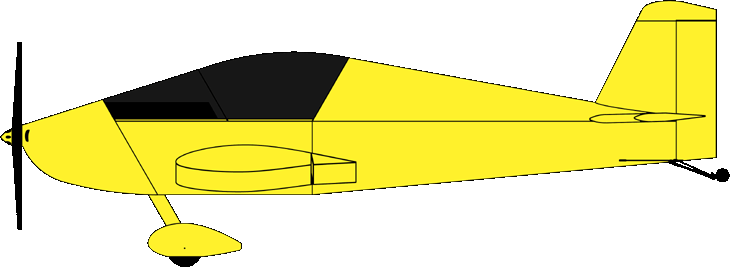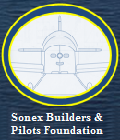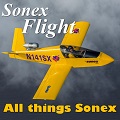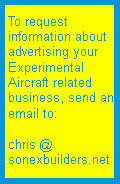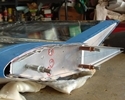

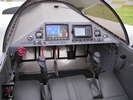
random user submitted photo
What am I missing?
Re: What am I missing?
So Help me out: Let's say we threw out the ideas "Keep it Simple" and "Keep it Inexpensive". What would be the ideal diameter for a Sonex. From previous posters herein it looks like one diameter may be best for take off and one would be best for top cruise speed, if so what would be the best compromise? I saw somewhere that the a 62" prop produces 200-250 lbs of thrust, a 72", 350, and a 84", 450. Don't get hung up on the specifics of these numbers, but it looks to me like there is an advantage to having a longer prop. Of course you don't want to have your prop hit the ground so maybe that's the reason a shorter diameter prop is specified on the Sonex??? Great Plains has a reduction drive for it's VW engine. Isn't the idea for this to be able to use a more "efficient", longer prop. Why would someone want a reduction drive??? Is it useful for the Sonex? I know that a longer stroke engine produces it's power at a lower RPM is that a benefit in the Aerovee 2180cc where the stroke is longer than the lesser displacement engines. It looks to me like the traditional aircraft engines like Continental and Lycoming produce their power at a Low RPM (around 2800). The Rotax 912 gets its power at 5800 RPM but has a reduction to bring it down to 2400. The Great Plains Reduction Drive gets the RPM down into the low 2000 range. It looks to me like lower RPM for an airplane is better. I understand Sonex's idea of keeping it simple and agree with it but I'm just trying to figure out if the keep it simple idea is the reason for no reduction drive???
- johnr9q@yahoo.com
- Posts: 33
- Joined: Wed Nov 26, 2014 2:34 pm
Re: What am I missing?
John -
I understand why you're asking. And we always want simple, straightforward answers & solutions... But in this case, there isn't one. The power, static thrust, and propeller efficiency are based on a big number of factors including the engine, the rpm, the air-pressure (or manifold pressure if its got forced-induction), the prop size, the prop pitch, the prop shape (props from different companies with the same diameter and pitch will behave differently), and more.
And the biggest thing to understand is that all of these things are interrelated. The very characteristics that improve static thrust and climb rate often directly reduce cruise speed and fuel-efficiency. When you change something you're not just adjusting one factor on an airplane; you're adjusting many factors all at the same time. The key is to find the right balance!
Take, for example, the reduction drive you mentioned in your post. Can it lower RPMs and possibly allow different props? Yes! Does that mean its inherently better? No! Even if it allows for better climbs and a better cruise speed (which it may not), you have to realize that the reduction drive will cause you to have a higher gross weight, more engine-failure possibilities, and more maintenance over time. Who's to say that 3 extra knots or an extra 100fpm (NOTE: I'm pulling numbers out of thin air) is worth the possibility that your engine becomes disconnected from the prop? How are you calculating the odds of a failure?
How small of a percentage gain in performance does it need to be, before it doesn't really have an impact on how much fun you have in the aircraft or how quickly you arrive at your destination? Because at some point you have to realize that its not about the numbers on paper, its how the experience is in-person; and are you really going to notice some of these small differences in performance?
Its important from time to time to take a "time out" and think about the aircraft's designers. Give them some credit - they have probably put more thought and effort into these design decisions than any single builder will! Good new ideas can come from anywhere; but if they recommend something there is probably a very good reason. If you don't understand the reason why they recommend a part or procedure, don't assume that they are ignorant. Your first reaction should be "Huh, I should ask them why..." (or "why not...").
Once you understand their reasoning you are welcome to disagree with them and go your own way (because this is Experimental Aviation, afterall). But at the very least, you owe it to yourself and your loved ones to understand why you are deviating from the design. In airplanes, what you don't know can hurt you.
--Noel
I understand why you're asking. And we always want simple, straightforward answers & solutions... But in this case, there isn't one. The power, static thrust, and propeller efficiency are based on a big number of factors including the engine, the rpm, the air-pressure (or manifold pressure if its got forced-induction), the prop size, the prop pitch, the prop shape (props from different companies with the same diameter and pitch will behave differently), and more.
And the biggest thing to understand is that all of these things are interrelated. The very characteristics that improve static thrust and climb rate often directly reduce cruise speed and fuel-efficiency. When you change something you're not just adjusting one factor on an airplane; you're adjusting many factors all at the same time. The key is to find the right balance!
Take, for example, the reduction drive you mentioned in your post. Can it lower RPMs and possibly allow different props? Yes! Does that mean its inherently better? No! Even if it allows for better climbs and a better cruise speed (which it may not), you have to realize that the reduction drive will cause you to have a higher gross weight, more engine-failure possibilities, and more maintenance over time. Who's to say that 3 extra knots or an extra 100fpm (NOTE: I'm pulling numbers out of thin air) is worth the possibility that your engine becomes disconnected from the prop? How are you calculating the odds of a failure?
How small of a percentage gain in performance does it need to be, before it doesn't really have an impact on how much fun you have in the aircraft or how quickly you arrive at your destination? Because at some point you have to realize that its not about the numbers on paper, its how the experience is in-person; and are you really going to notice some of these small differences in performance?
Its important from time to time to take a "time out" and think about the aircraft's designers. Give them some credit - they have probably put more thought and effort into these design decisions than any single builder will! Good new ideas can come from anywhere; but if they recommend something there is probably a very good reason. If you don't understand the reason why they recommend a part or procedure, don't assume that they are ignorant. Your first reaction should be "Huh, I should ask them why..." (or "why not...").
Once you understand their reasoning you are welcome to disagree with them and go your own way (because this is Experimental Aviation, afterall). But at the very least, you owe it to yourself and your loved ones to understand why you are deviating from the design. In airplanes, what you don't know can hurt you.
--Noel
- NWade
- Posts: 527
- Joined: Mon Aug 08, 2011 3:58 pm
Re: What am I missing?
It is all rather simple. There is a good explanation here:
http://www.epi-eng.com/propeller_techno ... peller.htm
Big static thrust generally comes at the expense of top end thrust. A Sonex is not a Kitfox. It would be dissapointing to have a Sonex with better takeoff and climb that only went 90 kts. For me, anyway.
Yes, landing gear is generally sized by prop clearance. Prop diameter is sized by engine RPM. Reduction drives are not light.
http://www.epi-eng.com/propeller_techno ... peller.htm
Big static thrust generally comes at the expense of top end thrust. A Sonex is not a Kitfox. It would be dissapointing to have a Sonex with better takeoff and climb that only went 90 kts. For me, anyway.
Yes, landing gear is generally sized by prop clearance. Prop diameter is sized by engine RPM. Reduction drives are not light.
Bryan Cotton
Poplar Grove, IL C77
Waiex 191 N191YX
Taildragger, Aerovee, acro ailerons
dual sticks with sport trainer controls
Prebuilt spars and machined angle kit
Year 2 flying and approaching 200 hours December 23
Poplar Grove, IL C77
Waiex 191 N191YX
Taildragger, Aerovee, acro ailerons
dual sticks with sport trainer controls
Prebuilt spars and machined angle kit
Year 2 flying and approaching 200 hours December 23
-

Bryan Cotton - Posts: 5493
- Joined: Mon Jul 01, 2013 9:54 pm
- Location: C77
Re: What am I missing?
johnr9q@yahoo.com wrote:…
Great Plains has a reduction drive for it's VW engine. Isn't the idea for this to be able to use a more "efficient", longer prop. Why would someone want a reduction drive??? Is it useful for the Sonex
…
Doesn’t matter, this is just not an option on a Sonex without a serious redesign of the mount, cowling etc. Have you seen how much room there is under the Sonex cowl with a VW engine installed?
Here’s mine:
Michael
Sonex #145 from scratch (mostly)
Taildragger, 2.4L VW engine, AeroInjector, Prince 54x48 P-Tip
VH-MND, CofA issued 2nd of November 2015
First flight 7th of November 2015
Phase I Completed, 11th of February 2016
http://www.mykitlog.com/rizzz/
Sonex #145 from scratch (mostly)
Taildragger, 2.4L VW engine, AeroInjector, Prince 54x48 P-Tip
VH-MND, CofA issued 2nd of November 2015
First flight 7th of November 2015
Phase I Completed, 11th of February 2016
http://www.mykitlog.com/rizzz/
- rizzz
- Posts: 869
- Joined: Tue Jun 21, 2011 2:07 am
- Location: Wollongong, NSW, Australia
Re: What am I missing?
Has anyone put a reduction drive in a Sonex? I'll do a search and see what I come up with.
- johnr9q@yahoo.com
- Posts: 33
- Joined: Wed Nov 26, 2014 2:34 pm
Re: What am I missing?
No VW with reduction drive in a Sonex that I'm aware of.
As I was suggesting above, I don't believe there is any room for this under the Sonex cowl, you would have to design a mount where the engine sits lower and further back. If it is possible at all, that wouldn't much leave room for anything else, not to mention the impact on CG.
I personally don't believe it is possible but people have been very creative before.
There are other engines with reduction drives that have been fitted on a Sonex:, the Rotax and the Viking.
As I was suggesting above, I don't believe there is any room for this under the Sonex cowl, you would have to design a mount where the engine sits lower and further back. If it is possible at all, that wouldn't much leave room for anything else, not to mention the impact on CG.
I personally don't believe it is possible but people have been very creative before.
There are other engines with reduction drives that have been fitted on a Sonex:, the Rotax and the Viking.
Michael
Sonex #145 from scratch (mostly)
Taildragger, 2.4L VW engine, AeroInjector, Prince 54x48 P-Tip
VH-MND, CofA issued 2nd of November 2015
First flight 7th of November 2015
Phase I Completed, 11th of February 2016
http://www.mykitlog.com/rizzz/
Sonex #145 from scratch (mostly)
Taildragger, 2.4L VW engine, AeroInjector, Prince 54x48 P-Tip
VH-MND, CofA issued 2nd of November 2015
First flight 7th of November 2015
Phase I Completed, 11th of February 2016
http://www.mykitlog.com/rizzz/
- rizzz
- Posts: 869
- Joined: Tue Jun 21, 2011 2:07 am
- Location: Wollongong, NSW, Australia
Re: What am I missing?
Might I suggest that if you want to widen the sonex, put a different motor. install re-drives, have a longer prop, etc that maybe you should be looking at a different airplane than a Sonex. There are hundreds of designs out there. You are much better off building one that already meets your mission goals than you are trying to re-design a Sonex. Have you flown in an aerovee or jabiru powered Sonex yet? If not, why spend all the time researching how to change it if you haven't even experienced flying the original design yet? The Sonex is a great airplane but maybe not ideal for everyone.
Keith
#554
Keith
#554
- kmacht
- Posts: 772
- Joined: Tue Jun 21, 2011 11:30 am
Re: What am I missing?
kmacht wrote:Might I suggest that if you want to widen the sonex, put a different motor. install re-drives, have a longer prop, etc that maybe you should be looking at a different airplane than a Sonex. There are hundreds of designs out there. You are much better off building one that already meets your mission goals than you are trying to re-design a Sonex. Have you flown in an aerovee or jabiru powered Sonex yet? If not, why spend all the time researching how to change it if you haven't even experienced flying the original design yet? The Sonex is a great airplane but maybe not ideal for everyone.
Keith
#554
Extremely good point!
Michael
Sonex #145 from scratch (mostly)
Taildragger, 2.4L VW engine, AeroInjector, Prince 54x48 P-Tip
VH-MND, CofA issued 2nd of November 2015
First flight 7th of November 2015
Phase I Completed, 11th of February 2016
http://www.mykitlog.com/rizzz/
Sonex #145 from scratch (mostly)
Taildragger, 2.4L VW engine, AeroInjector, Prince 54x48 P-Tip
VH-MND, CofA issued 2nd of November 2015
First flight 7th of November 2015
Phase I Completed, 11th of February 2016
http://www.mykitlog.com/rizzz/
- rizzz
- Posts: 869
- Joined: Tue Jun 21, 2011 2:07 am
- Location: Wollongong, NSW, Australia
Re: What am I missing?
So after reading all you posted and much searching on the internet I have come to a conclusion: The Sonex airplane is an excellent airplane but the motors that Sonex supports are questionable. When I search on the internet and read other forums (as well as this one) I don't get warm fuzzy feelings about the Aerovee or the Jabiru engines. I know much of what I read is not based in fact but considering the volume of criticism, my confidence level is low on these engines. When I search for negative information on the Rotax 912 I don't come up with much. I know Sonex wants to keep it simple (also interpreted as inexpensive) so if they supported the Rotax the cost of a Sonex wouldn't be much less that a RV-12 or a Zodiac 650 but a Sonex with a 912 would be a good combination.
- johnr9q@yahoo.com
- Posts: 33
- Joined: Wed Nov 26, 2014 2:34 pm
What am I missing?
The Internet is an interesting place. I believe you may also find information about jet contrails being "chemtrails."
There are lots of cool cat videos also.
My point is this - experimental aircraft engines are different than certified aircraft engines.
The price and weight are two basic differences.
There are lots of cool cat videos also.
My point is this - experimental aircraft engines are different than certified aircraft engines.
The price and weight are two basic differences.
Robbie Culver
Sonex 1517
Aero Estates (T25)
First flight 10/10/2015
375+ hours
Jabiru 3300 Gen 4
Prince P Tip
Taildragger
N1517S
Sonex 1517
Aero Estates (T25)
First flight 10/10/2015
375+ hours
Jabiru 3300 Gen 4
Prince P Tip
Taildragger
N1517S
-

Sonex1517 - Posts: 1670
- Joined: Fri Jun 03, 2011 10:11 am
- Location: T25 Aero Estates, Frankston, TX
Who is online
Users browsing this forum: No registered users and 72 guests
